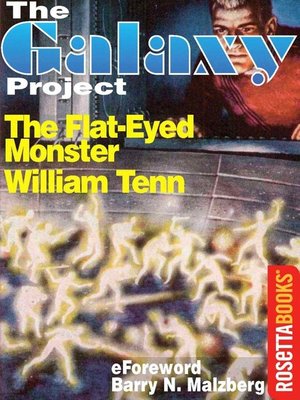
Sign up to save your library
With an OverDrive account, you can save your favorite libraries for at-a-glance information about availability. Find out more about OverDrive accounts.
Find this title in Libby, the library reading app by OverDrive.



Search for a digital library with this title
Title found at these libraries:
| Library Name | Distance |
|---|---|
| Loading... |
THE FLAT-EYED MONSTER (August 1955) is exemplary of the story of distorted or skewed perspective which fascinated Horace Gold, the editor of GALAXY magazine. Call these "reversals" in which the use of uncommon perspective skews the material under observation into a new formulation. Here, the "alien" is human, the "predicament" is one which the aliens face in his presence and the mysterious, alien forces exerted by the protagonist are as seemingly involuntary as they are threatening. By the summer of 1955, Phillip Klass had fully asserted himself as Gold's first-line satirist in an increasingly satirical magazine and the offhand panache of this story and its fluidity fail to mask real horror. (This was a familiar ploy of Klass's; it is manifest in his early and perhaps most famous story, CHILD'S PLAY in the March 1947 ASTOUNDING.) The story's predicament is a masterpiece of solipsism expressed in false omnipotence, the payoff is both utterly surprising and retrospectively inevitable. "Who is the real alien?" and "What is the true nature of alienness?" were questions which—perhaps as a product of his own severe, entrapping neurosis—obsessed Horace Gold and his magazine became a means of search toward an answer. Klass and this novelette are cunning enough to raise the possibility that its solipsistic and imprisoned protagonist is a portrait of Horace Gold, that the "aliens" he is manipulating are Gold's contributors...and that Gold, editor and solipsist ultimately gets exactly what he deserves. "Ah, Phil," Klass (in an essay thirty years later imagines Horace saying to him), "You were never a mere instrument."







